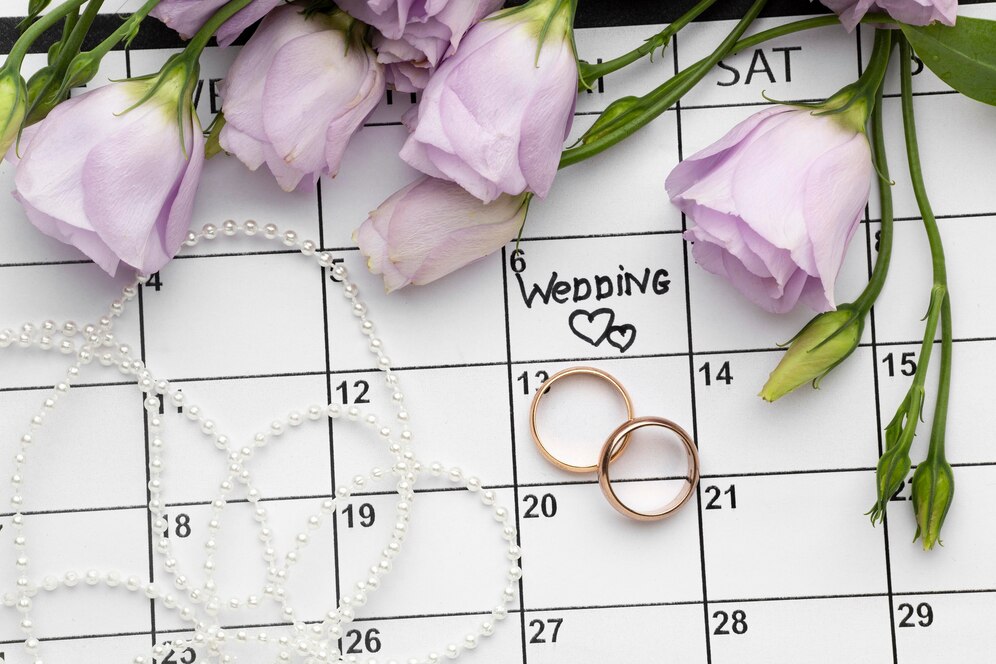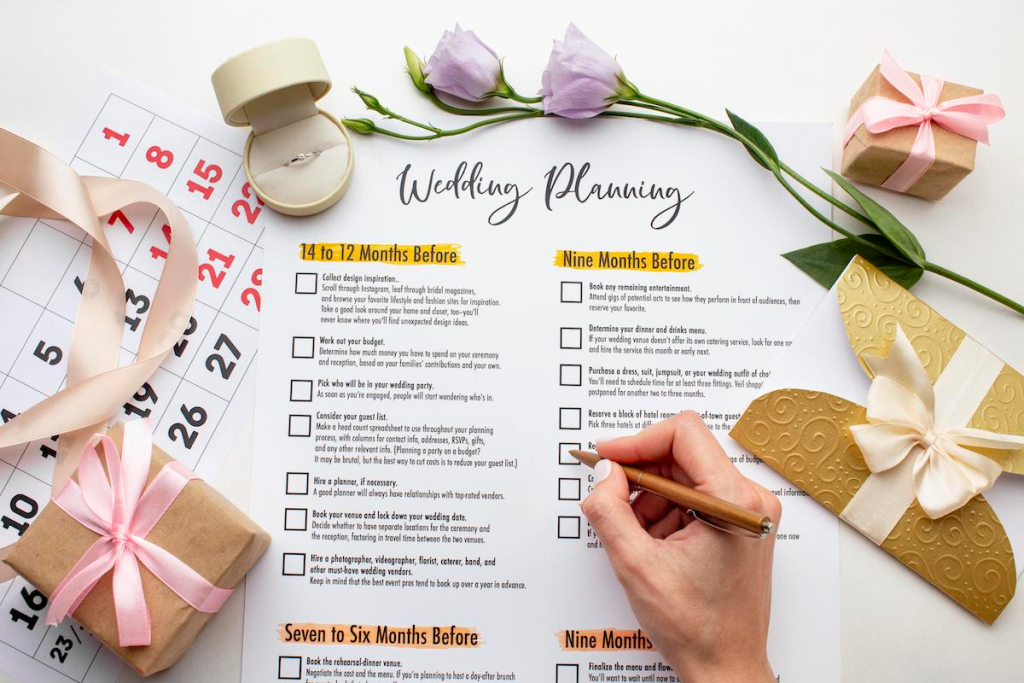Planning Your Dream Wedding: A Comprehensive Checklist for National Wedding Month in February

February, also known as National Wedding Month, is a time when love is celebrated, and couples embark on the journey of planning their dream weddings.
February became known as National Wedding Month for several reasons, primarily due to its association with romance and love, notably highlighted by Valentine’s Day on February 14th. Here are a few reasons why February became synonymous with weddings:
Valentine’s Day
Valentine’s Day has long been celebrated as a day of love and romance. Many couples choose this day to express their commitment to each other through marriage or engagement, making February a popular month for weddings.
Historical Significance
In some cultures and traditions, February has historical significance as a month for weddings. For example, in Roman mythology, February was associated with the goddess Juno, who was considered the patroness of marriage and childbirth.
Seasonal Considerations
In certain regions, February marks the end of winter and the beginning of spring, symbolizing new beginnings and fresh starts. The milder weather and blooming flowers can provide a picturesque backdrop for weddings, making it an attractive month for couples to tie the knot.
Venue Availability
February may offer more availability and flexibility for wedding venues and vendors compared to peak wedding months like June or September. Couples may find it easier to secure their desired venue and vendors during this time, leading to the popularity of February weddings.
Romance and Symbolism
The association of February with love and romance, coupled with its shorter length compared to other months, adds to its appeal as a month for weddings. Couples may find the symbolism of getting married in the month dedicated to love meaningful and significant.
Wedding Planning Checklist

Amidst the flurry of excitement and preparations, it’s crucial to keep in mind not only the details of the wedding day but also long-term goals, such as owning a house and lot. In this article, we’ll provide a comprehensive wedding checklist, to guide you through planning your dream wedding while simultaneously considering your future home.
Start Early and Set a Budget
Beginning the wedding planning process early allows couples to carefully consider their financial resources and establish a realistic budget, ensuring that expenses are managed effectively throughout the planning process.
The would be couple also needs to determine the number of their out of town guests if they need to take care of their transportation arrangements. The best way to handle the voluminous wedding is get a wedding party member involved as early as possible to get the tasks off the ground.
Determine Your Wedding Style and Priorities
Identifying the desired wedding style, wedding theme, and priorities enables couples to make informed decisions about venue selection, decor, and other details, ensuring that the wedding reflects their unique vision and values.
Aligned with the wedding theme is deciding whether you will hold a traditional wedding ceremony or church wedding or a destination wedding.
Create a Wedding Timeline
Developing a detailed timeline and printable wedding planning checklist for the wedding day helps to coordinate various aspects of the event, including ceremonies, receptions, and vendor arrivals, ensuring a seamless and well-organized celebration.
Choose the Perfect Venue
Selecting a venue that aligns with the couple’s preferences and budget sets the foundation for the entire wedding experience, providing a beautiful and suitable backdrop for the celebration of their love. More than the wedding reception venues, rehearsal dinner venue, wedding shower, bridal parties, engagement party, and reception parties.
Build Your Dream Team of Suppliers
Assembling a team of trusted vendors and suppliers who understand the couple’s vision and can execute their plans effectively ensures a smooth and successful wedding day, from catering and photography to entertainment and floral arrangements. They are vital part of your wedding party members.
Design Your Wedding Registry with Purpose
Creating a wedding registry with thoughtful and purposeful items allows couples to receive gifts that are meaningful and useful in building their future together, whether it’s household essentials, experiences, or contributions towards larger purchases like a house and lot.
Incorporate Personal Touches and DIY Projects
Infusing the wedding with personal touches and DIY projects adds a unique and heartfelt element to the celebration, reflecting the couple’s personalities and creating memorable moments for themselves and their guests.
Wedding Planning Timeline

The timeline for wedding preparation can vary depending on factors such as the size of the wedding, complexity of the wedding invitation and arrangements, and personal preferences.
However, here’s a general guideline for the timeline of wedding preparation, starting from approximately 12-18 months before the wedding day:
12-18 Months Before the Wedding:
Set a Budget: Determine your overall budget for the wedding and allocate funds to different aspects such as venue, catering, attire, and entertainment.
Create a Guest List: Begin compiling a list of guests you wish to invite to the wedding, considering both sides of the family, friends, and any other important individuals.
Choose a Date and Venue: Select a wedding date and start researching potential venues for both the ceremony and reception. Consider factors such as availability, capacity, location, and budget.
Hire Key Suppliers: Book essential suppliers such as the caterer, photographer, videographer, and entertainment (DJ or band). Ensure to review contracts and secure their services.
Start Shopping for Attire: Begin shopping for wedding attire, including the bridal gown, bridesmaid dresses, groom’s attire, and attire for the groomsmen.
Plan Ceremony and Reception Details: Start planning the ceremony and reception details, including themes, decor, and overall ambiance. Begin researching and booking vendors for floral arrangements, decor rentals, and other services.
6-12 Months Before the Wedding:
Finalize Guest List: Complete your guest list and send out save-the-date cards to inform guests of your wedding date and location.
Order Invitations: Select and order wedding invitations, RSVP cards, and other stationery items. Consider hiring a calligrapher for addressing envelopes if desired.
Choose Wedding Party: Invite friends and family members to be part of your wedding party as bridesmaids, groomsmen, maid of honor, best man, etc.
Plan Honeymoon: Start researching and planning your honeymoon destination, including travel arrangements and accommodations.
Book Remaining Vendors: Secure the services of remaining vendors such as transportation, hair and makeup stylists, officiant, and any other necessary services.
Arrange Wedding Insurance: Consider purchasing wedding insurance to protect against unforeseen circumstances such as cancellations or damages.
3-6 Months Before the Wedding:
Finalize Details: Confirm arrangements with vendors, including finalizing menus, floral arrangements, and entertainment selections.
Order Wedding Rings: Choose and order wedding bands for both partners, allowing time for sizing and engraving if desired.
Finalize Attire: Schedule final fittings for wedding attire and accessories. Ensure that all members of the wedding party have their attire ready.
Send Invitations: Send out wedding invitations, including RSVP cards with a deadline for responses.
Plan Rehearsal Dinner: Organize details for the rehearsal dinner, including venue, menu, and guest list.
Finalize Ceremony Details: Plan the ceremony order, including readings, music selections, and any special rituals or traditions.
1-3 Months Before the Wedding:
Follow Up with Guests: Follow up with guests who have not yet RSVP’d to confirm their attendance.
Finalize Seating Arrangements: Create seating charts or escort cards and finalize seating arrangements for the ceremony and reception.
Confirm Details: Confirm final details with all vendors, including delivery times and any special instructions.
Obtain Marriage License: Obtain a marriage license from the appropriate local authority, ensuring you have all necessary documentation.
Attend Pre-Wedding Events: Attend any pre-wedding events such as bridal showers, bachelor/bachelorette parties, and rehearsal dinners.
Pack for Honeymoon: Begin packing for your honeymoon, ensuring you have all necessary travel documents and essentials.
1 Week Before the Wedding:
Finalize Payments: Make final payments to vendors and prepare gratuities for service providers.
Confirm Timeline: Review the wedding day timeline with all vendors and members of the wedding party.
Prepare Wedding Emergency Kit: Assemble a wedding emergency kit with essentials such as safety pins, stain remover, band-aids, and other necessities.
Confirm Honeymoon Details: Confirm travel arrangements and accommodations for your honeymoon, ensuring everything is in order.
Relax and Enjoy: Take some time to relax and enjoy the moments leading up to your wedding day.
On the Wedding Day:
Get Ready: Begin getting ready for the day, allowing plenty of time for hair, makeup, and dressing.
Stay Hydrated and Nourished: Stay hydrated and nourished throughout the day to maintain energy and hydration.
Enjoy the Moment: Take in the special moments of your wedding day and cherish the memories with your partner, family, and friends.
Delegate Responsibilities: Delegate tasks to trusted friends or family members to ensure everything runs smoothly.
Have Fun: Most importantly, have fun and celebrate your love with those closest to you!
By following this general timeline for wedding preparation, couples can ensure a smooth and stress-free planning process leading up to their special day. However, it’s essential to remain flexible and adaptable to their wedding budget to accommodate any unexpected changes or challenges that may arise along the way.
Plan for the Future
Set aside time to discuss your future goals as a couple, including homeownership and financial planning. Consult with a financial advisor to develop a savings plan and investment strategy that aligns with your wedding and homeownership goals. Stay flexible and adaptable throughout the planning process, making adjustments as needed to prioritize your long-term objectives.
Consider exploring options with Camella, a reputable real estate developer known for its quality house and lot packages. Stay flexible and adaptable throughout the planning process, making adjustments as needed to prioritize your long-term objectives, such as owning your dream home with Camella.
Conclusion
As you embark on the journey of planning your dream wedding during National Wedding Month in February, remember to keep your future home in mind.
By following this comprehensive checklist and incorporating elements that align with your long-term goals, you can create a memorable wedding celebration while taking steps towards owning your dream house and lot.
Whether it’s setting a budget, choosing the perfect, wedding venue together, or curating a purposeful wedding registry, every decision brings you closer to a future filled with love, happiness, and homeownership. Happy planning!

Celebrate Life’s Milestones in Camella!
Make unforgettable memories in a Camella home.
Our communities are designed to elevate your living experience.


